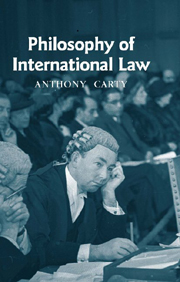Book contents
- Frontmatter
- Contents
- Preface and Acknowledgments
- 1 What Place for Doctrine in a Time of Fragmentation?
- 2 Continuing Uncertainty in the Mainstream
- 3 International Legal Personality
- 4 The Use of Force
- 5 American Legal Cultures of Collective Security
- 6 Marxism and International Law
- 7 Resistances to the Neoliberal International Economic Order
- 8 From an Order of Fear to One of Respect
- Index
2 - Continuing Uncertainty in the Mainstream
Published online by Cambridge University Press: 12 September 2012
- Frontmatter
- Contents
- Preface and Acknowledgments
- 1 What Place for Doctrine in a Time of Fragmentation?
- 2 Continuing Uncertainty in the Mainstream
- 3 International Legal Personality
- 4 The Use of Force
- 5 American Legal Cultures of Collective Security
- 6 Marxism and International Law
- 7 Resistances to the Neoliberal International Economic Order
- 8 From an Order of Fear to One of Respect
- Index
Summary
There is no consensus among International lawyers on a workable or operable concept of general customary law, supposed to be the fundamental source of an international law binding upon states. It is thought to represent an analytical framework within which one can assess whether states recognize a rule, principle, or practice as binding upon them as law. Jurists are to examine the same ‘raw material’ of international relations as diplomats, statesmen, historians, and political scientists. Yet according to the most orthodox view, expressed in the jurisprudence of the ICJ the jurists are to find that states have, in some sense, a legal conscience or sense of conviction. In the North Sea Continental Shelf cases the ICJ said that the ‘practice of states’ relevant to the assertion that a rule of customary international law exists must:
be such, or be carried out in such a way, as to be evidence of a belief that this practice is rendered obligatory by the existence of a rule of law requiring it (opinio juris sive necessitatis) … The states concerned must therefore feel that they are conforming to what amounts to a legal obligation …
The basic problems with this formulation have been put squarely by Sorensen and D'Amato. Sorensen points out how the very nature of relations among states makes ascertainment of an evolving customary law virtually impossible. Diplomatic negotiations remain so closed and secret that not even the representatives of one state will know what are the underlying motives of their opposite numbers. Yet such motivation is essential to the psychological element of custom.
- Type
- Chapter
- Information
- Philosophy of International Law , pp. 26 - 78Publisher: Edinburgh University PressPrint publication year: 2007



